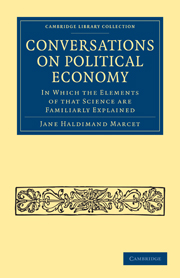Book contents
- Frontmatter
- PREFACE
- Contents
- CONVERSATION I INTRODUCTION
- CONVERSATION II INTRODUCTION—continued
- CONVERSATION III ON PROPERTY
- CONVERSATION IV PROPERTY—continued
- CONVERSATION V ON THE DIVISION OF LABOUR
- CONVERSATION VI ON CAPITAL
- CONVERSATION VII CAPITAL—continued
- CONVERSATION VIII ON WAGES AND POPULATION
- CONVERSATION IX WAGES AND POPULATION—continued
- CONVERSATION X ON THE CONDITION OF THE POOR
- CONVERSATION XI ON REVENUE
- CONVERSATION XII REVENUE FROM LANDED PROPERTY
- CONVERSATION XIII REVENUE FROM THE CULTIVATION OF LAND
- CONVERSATION XIV REVENUE FROM CAPITAL LENT
- CONVERSATION XV ON VALUE AND PRICE
- CONVERSATION XVI ON MONEY
- CONVERSATION XVII MONEY—continued
- CONVERSATION XVIII COMMERCE
- CONVERSATION XIX ON FOREIGN TRADE
- CONVERSATION XX FOREIGN TRADE—cont.
- CONVERSATION XXI ON EXPENDITURE
- INDEX
CONVERSATION VI - ON CAPITAL
Published online by Cambridge University Press: 07 September 2011
- Frontmatter
- PREFACE
- Contents
- CONVERSATION I INTRODUCTION
- CONVERSATION II INTRODUCTION—continued
- CONVERSATION III ON PROPERTY
- CONVERSATION IV PROPERTY—continued
- CONVERSATION V ON THE DIVISION OF LABOUR
- CONVERSATION VI ON CAPITAL
- CONVERSATION VII CAPITAL—continued
- CONVERSATION VIII ON WAGES AND POPULATION
- CONVERSATION IX WAGES AND POPULATION—continued
- CONVERSATION X ON THE CONDITION OF THE POOR
- CONVERSATION XI ON REVENUE
- CONVERSATION XII REVENUE FROM LANDED PROPERTY
- CONVERSATION XIII REVENUE FROM THE CULTIVATION OF LAND
- CONVERSATION XIV REVENUE FROM CAPITAL LENT
- CONVERSATION XV ON VALUE AND PRICE
- CONVERSATION XVI ON MONEY
- CONVERSATION XVII MONEY—continued
- CONVERSATION XVIII COMMERCE
- CONVERSATION XIX ON FOREIGN TRADE
- CONVERSATION XX FOREIGN TRADE—cont.
- CONVERSATION XXI ON EXPENDITURE
- INDEX
Summary
MRS. B
IN tracing the progress of society towards civilization, we noticed the happy effects resulting from the security of property and the division of labour. From this period we may also date the distinction of rich and poor.
CAROLINE
And all the evils that arise from inequality of condition. This, alas! is the dark side of the picture. The weeds spring up with the corn.
MRS. B
I know not how this distinction can be called an evil. If it does not exist in a savage state, it is because indigence is universal; for no one being able to acquire more than what is necessary for his immediate maintenance, every one is poor. When civilization takes place, the advantages arising from the division of labour enable an industrious skilful man to acquire more wealth than will suffice to gratify his wants or desires. By continued exertion this surplus produce of his industry in the course of time accumulates, and he becomes rich, whilst the less industrious, who acquires merely a daily subsistence, remains poor or possessed of nothing.
CAROLINE
I see no great advantage in this accumulation of wealth, for it must either be spent or hoarded; if spent, the industrious man is eventually no richer than his idle neighbours; and if hoarded, the accumulation is of no use to any one.
- Type
- Chapter
- Information
- Conversations on Political EconomyIn Which the Elements of that Science are Familiarly Explained, pp. 82 - 99Publisher: Cambridge University PressPrint publication year: 2010First published in: 1816



